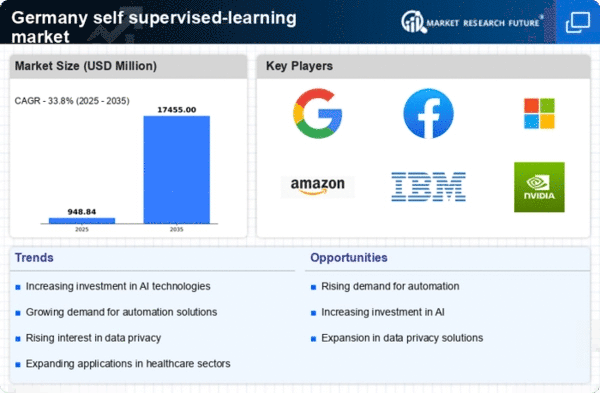Growing Data Availability
The self supervised-learning market is benefiting from the exponential growth of data generated across multiple platforms in Germany. With the rise of IoT devices, social media, and digital transactions, vast amounts of unlabelled data are becoming available for training self supervised-learning models. This abundance of data is crucial, as self supervised-learning techniques thrive on large datasets to improve model accuracy and performance. Reports indicate that data generation in Germany is expected to reach 50 zettabytes by 2030, creating a fertile ground for the self supervised-learning market to flourish. Companies are increasingly recognizing the potential of leveraging this data to derive insights and enhance decision-making processes, thereby driving the adoption of self supervised-learning technologies.
Rising Demand for Automation
The self supervised-learning market is experiencing a notable surge in demand for automation across various sectors. Industries such as manufacturing, finance, and healthcare are increasingly adopting self supervised-learning techniques to enhance operational efficiency and reduce costs. According to recent data, the automation market in Germany is projected to grow at a CAGR of 8.5% from 2025 to 2030. This growth is likely to drive the self supervised-learning market as organizations seek to leverage advanced algorithms for predictive maintenance, fraud detection, and patient diagnosis. The integration of self supervised-learning models into existing systems appears to be a strategic move for companies aiming to remain competitive in a rapidly evolving technological landscape. As automation becomes more prevalent, the self supervised-learning market is expected to expand significantly, reflecting the broader trend towards intelligent systems.
Enhanced Computational Resources
The self supervised-learning market is poised for growth due to advancements in computational resources. The proliferation of cloud computing and high-performance computing (HPC) facilities is enabling organizations to process large datasets more efficiently. This is particularly relevant for self supervised-learning, which often requires substantial computational power for model training and evaluation. The availability of scalable cloud solutions is likely to lower the barriers to entry for smaller companies, allowing them to leverage self supervised-learning technologies without significant upfront investment. As computational capabilities continue to improve, the self supervised-learning market is expected to expand, providing businesses with the tools necessary to harness the power of AI.
Regulatory Support for AI Technologies
The regulatory landscape in Germany is evolving to support the growth of AI technologies, including the self supervised-learning market. Recent initiatives by the German government aim to create a framework that encourages innovation while ensuring ethical standards and data protection. The establishment of guidelines for AI deployment is likely to instill confidence among businesses, facilitating investment in self supervised-learning solutions. Moreover, the European Union's AI Act, which emphasizes transparency and accountability, is expected to influence the self supervised-learning market positively. As regulations become more favorable, organizations may be more inclined to adopt self supervised-learning technologies, leading to increased market penetration and growth opportunities.
Investment in AI Research and Development
Germany's commitment to advancing artificial intelligence (AI) research is a critical driver for the self supervised-learning market. The German government has allocated substantial funding, estimated at €3 billion, to support AI initiatives over the next five years. This investment is likely to foster innovation in self supervised-learning methodologies, enabling researchers and developers to create more sophisticated models. Furthermore, collaboration between public and private sectors is anticipated to enhance the development of self supervised-learning applications, particularly in areas such as natural language processing and computer vision. As the self supervised-learning market evolves, the influx of resources and talent could lead to breakthroughs that significantly impact various industries, positioning Germany as a leader in AI technology.
















